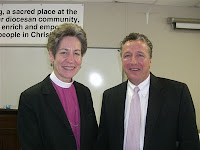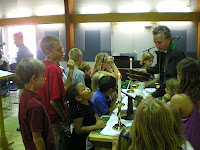
Today’s class started on a high note when Marty Hallas brought in a pan of fresh, hot beignets. We enjoyed them mightily as the Canterbury students in the Parish Hall were learning about healthy living. After beignets, we worked through Genesis 5 and part of 6. We continued to emphasize that Genesis is a book of theology written in ancient Mesopotamia. It is not a “history” as defined by contemporary standards.
Genesis 5 is mostly the work of the Priestly writer. The writer briefly retells the creation of “humankind” in the likeness of God. However, when Adam has a son, Seth, the son is only in the likeness of his human father, not God. (Cain and Abel are missing from this genealogy.) Mankind has fallen from its original state. Most of Genesis 5 is a genealogy showing the importance of the first born, even though much of the book of Genesis will deal with the preference of the younger over the older.
Genesis 6 introduces some surprises, particularly the “sons of God” who take wives from the daughters of men, who bore children to them. It also tells that “Nephilim” lived on the earth in those days. There is no clear explanation of these creatures, but perhaps the non-Priestly writers were trying to say corruption had reached beyond all bounds.
The non-Priestly writer then goes on to make an important statement. God was sorry that he had made mankind, as the evil of mankind “grieved him to his heart”. Unlike the Mesopotamian gods, humans matter to the God of Genesis. Good or bad, God cares about his creation.
Noah is introduced as a righteous man. This concept of righteousness had to do with correct actions. Noah lived in such a way as to “fit” into the order of God’s creation. He does not break relationships between God and neighbor so as to disrupt God’s intended order.
We also looked at an interesting comparison of the Genesis flood story and the flood story from the Mesopotamian Gilgamesh epic.
Submitted by Barbara Suhar




.jpg)
































